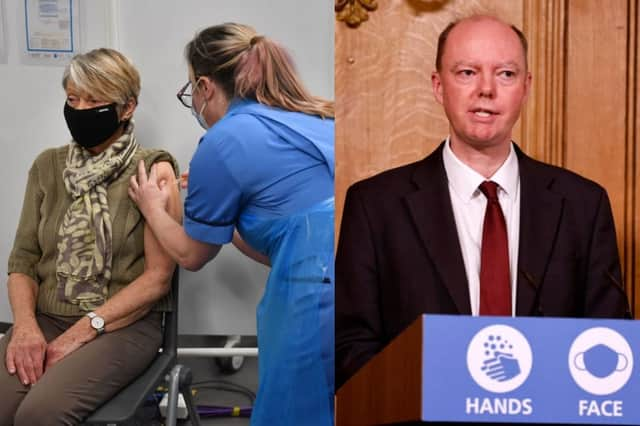‘Worst is yet to come’ for Covid-19 infections - what you need to know


The UK has not yet reached the peak of the current wave of Covid-19 infections, England’s chief medical officer has warned.
Professor Chris Whitty has said the coming few weeks will mark “the worst” of the pandemic for the NHS, as coronavirus cases across the country continue to soar.
Advertisement
Advertisement
Worst still to come
Prof Whitty said that the new variant of coronavirus is causing a “significant problem” in the UK, with the mutated strain being much more transmissible.
It is hoped that the vaccination rollout will help to bring case rates back under control and will allow lockdown restrictions to be eased in the coming months.
However, the current UK death rate has been described as “appalling”.
Speaking on BBC Radio 4’s Today programme, Prof Whitty said: “I don’t think we’re yet at the peak, I’m afraid.
Advertisement
Advertisement
“I think we will be at the peak if everybody can double down and absolutely minimise their contacts.
“The point of the lockdown is to bring that forward, but it only works if everyone really thinks about every individual interaction they have and try to minimise them,
“We will get through this together, but at this point in time we’re at the worst point in the epidemic in the UK.”
Warning of tougher controls
The warning from the chief medical officer comes as Prime Minister Boris Johnson has discussed the prospect of introducing even tougher controls to ensure the public abide by the restrictions.
Advertisement
Advertisement
Mr Johnson stressed that "now is the moment for maximum vigilance" and that stricter measures may be needed "if we feel that things are not being properly observed".
This could potentially see rules changed to prevent people from exercising with one other person outdoors.
However, when asked if coronavirus is being spread outdoors, Prof Whitty said the risks were much lower than inside.
The said the risks from jogging past someone in the street were “very low”, but warned problems could occur if people gathered in groups
Advertisement
Advertisement
He said: “If people, for example, are crowded together in a queue outdoors, if they’re really huddled together round a market stall or something - that is a risk with this virus - and in that situation there might be some logic to people thinking about wearing masks.”
“I think that the much more important thing is that people should not be leaving their home unless they absolutely have to. And where they do, try and keep their distance from people.”
“Everybody knows what they need to do. And I think that’s the key thing – minimise the number of contacts.”
Measures could remain until spring
Prof Whitty said current measures could still be needed until “some time in the spring” to stem the spread of the virus, but he suggested that it will be “months, not years” until life gets back to normal.
Advertisement
Advertisement
His comments come as seven mass vaccination centres opened across England on Monday (11 January) in a bid to ramp up the rollout of coronavirus vaccines from Pfizer and AstraZeneca.
Around two million people in the UK have now been vaccinated against Covid-19 as the government aims to hit a target of vaccinating around 13 million at highest risk by the middle of February.
The new centres include Ashton Gate in Bristol, Epsom racecourse in Surrey, the Excel Centre where London’s Nightingale hospital is based, Newcastle’s Centre for Life, the Manchester Tennis and Football Centre, Robertson House in Stevenage and Birmingham’s Millennium Point.
These sites will offer jabs to people aged 80 and above, along with health and care staff, and will be joined later this week by hundreds more GP-led and hospital services, along with the first pharmacy-led pilot sites.
Advertisement
Advertisement
This will take the total vaccination hubs to around 1,200, NHS England said.
In Scotland, the Oxford/AstraZeneca jab is now available in more than 1,000 locations.
Later on Monday (11 January), Health Secretary Matt Hancock is due to set out the government’s vaccines delivery plan, hailing it as the “keystone of our exit out of the pandemic”.